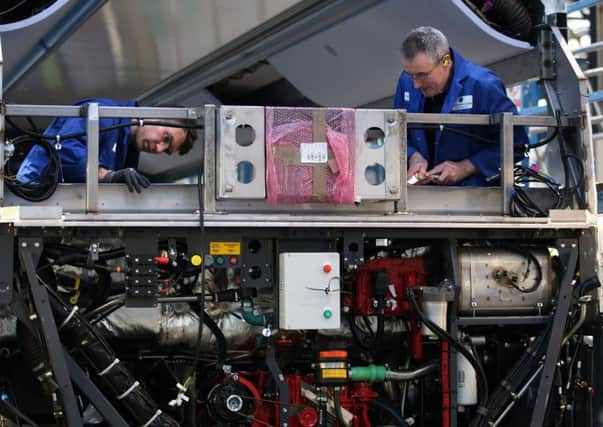Manufacturing sector hit five-month high ahead of Brexit


The closely-watched purchasing managers’ index (PMI) from Markit and the Chartered Institute of Procurement & Supply (Cips) showed a reading of 52.1 for June – its highest level since January – as it climbed from a revised reading of 50.4 in May.
However, the study was made between 13 and 27 June, with 99 per cent of the responses coming before it was revealed that Britain had opted to exit the EU.
Advertisement
Hide AdAdvertisement
Hide AdIt said the uptick in manufacturing production was driven by an acceleration in new work, while new orders rose at their fastest pace since last October as the domestic market continued to show strength.
Markit senior economist Rob Dobson said: “Whether this growth recovery can be sustained will depend heavily on whether the current financial and political volatility spills over to the real economy.
“While the Bank of England remains poised to act if needed and the UK’s trading relationships are unchanged during the two-year negotiation period, there’s a clear risk that ongoing uncertainty will have at least some short-term impact on manufacturing during the coming quarters.”
The study found that an increase in new work from overseas was triggered by higher sales from the US, mainland Europe, Russia and East Asia.
But despite the improvement, lower levels of employment continued to dog the sector, with job losses reported for the sixth straight month.
David Noble, group chief executive officer at Cips, said companies were “eager to improve efficiency, and control costs”.
He said: “Uncertainty about the outcome of the referendum and recent indecision from clients placing new orders continued to take their toll on an already challenged industry.”
The brighter picture for the UK manufacturing industry comes despite deep concerns about UK economic growth in the wake of the Brexit vote.
Advertisement
Hide AdAdvertisement
Hide AdEconomists have slashed their forecasts for UK gross domestic product (GDP), while Bank of England governor Mark Carney yesterday signalled that interest rates could be cut over the summer to help boost the UK economy.
In the moments after last week’s referendum result, economists at IHS Global Insight downgraded their forecast for GDP this year to 1.5 per cent, down from 2 per cent previously, and to just 0.2 per cent for 2017.
Mike Rigby, head of manufacturing at Barclays, said: “Encouraging as these pre-referendum figures are, the uncertainty that beset the manufacturing industry ahead of the EU referendum shows no sign of abating following last week’s vote and will inevitably thwart important investment decisions needed to help boost growth.
“The short-term effects for exporters may well be positive, as sterling depreciates, but the long term impact of trade agreements, labour supply and a slower economy will weigh heavy on the mind.”
